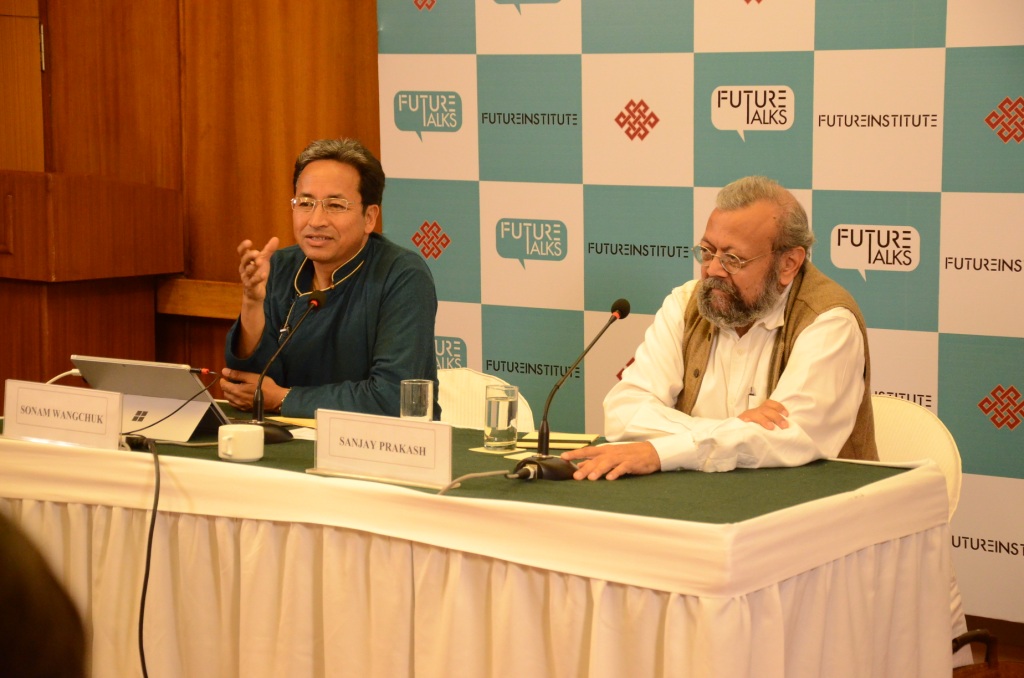- International Rolex Award 2016 Laureate
- Future Talks – The Master Planner For the University
New Delhi, India, 28th November 2016: The Real Life ‘Phunsukh Wangdu’ of 3 Idiots Mr. Sonam Wangchuk, who has been recently awarded the prestigious ‘Rolex Awards for Enterprise 2016’ for his innovation of Ice Stupas, was the guest speaker for the evening at a Talk Series organized by the Future Institute in New Delhi. He shared his journey and vision of transforming the conventional education system to an alternative learning approach through his visionary project of establishing a university for alternative learning in Ladakh.

Sonam was invited as the first speaker of the Future Talk series titled “The Next Learning Revolution”, at the India International Centre, that seeks to bring some of the world’s most renowned urban thinkers and practitioners on an integrated platform. Aptly named “Future Talks”, this prolific and noble initiative is a step towards creating a more responsible, resilient and liveable future and transforming the potential of our nation. The event witnessed the presence of many distinguished intellects from diverse fields; with Mr. Naeem Akhtar, Minister for Education, J&K, as the Chief Guest along with many distinguished names from the industry including Mr. Nawaaz Rigzin Jora, Minister for Urban Development and Urban Local Bodies, J&K,Prof. Ajay Mathur, Dr. Ashok Khosla, and others gracing the occasion, and Mr. Sonam Wangchuk– a renowned engineer-turned-education reformist from Ladakh as the Guest Speaker.
Announcing the proposed Alternative University (with Future Institute as the master planning partner) in Ladakh, Mr. Wangchuk said, “We are preparing to launch our most ambitious project till date – Himalayan Institute of Alternatives, Ladakh (HIAL), an alternative university for mountain development, which will use our 25 years of experience of hands-on practical education at SECMOL school and scale it up for higher education at international level.” The event also marked the launch of a global crowd-funding campaign for contributing to the making of HIAL, to which Mr. Wangchuk said, “I have decided to donate the award money of roughly One crore rupees towards this university, to quickly begin the greening of desert while funds for construction, etc. start flowing in.”
The local government of Ladakh has been very supportive of the project by giving 200 acres of land for the construction of the university. The vision of the university would be to provide the young generation of Ladakh with a platform where they would be running various enterprises, the funds from which will play a major role in running the university. In this regard Mr. Wangchuk said, “It will be the sweat equity that the students will be paying as a fee for the university. Moreover, The Himalyan Institute of Alternatives will engage the students in finding real solutions to real life challenges faced by the people of the mountains. The university will change the face of higher education in India and the future of it has already begun.” The talk was followed by an interactive session with the participants deliberating their diverse and stimulating thoughts with Mr. Wangchuk.
Mr. Naeem Akhtar extended his whole-hearted support for the initiative and acknowledged Future Institute for bringing out a Talk Series focusing on an environment-sensitive urban transformation of our nation. Emphasizing his keenness towards supporting such manoeuvre, he stated “Ilaud Mr. Wangchuk and the Future Institute for their noble initiative towards a better and sustainable future which is the need of the hour”.
Mr. Wangchuk has made the nation proud by winning the Rolex Award, and his vision of an alternative university will go a long way in transforming the future of higher education across the globe.
About Future Institute:
Future Institute is a multidisciplinary applied research platform that enables and undertakes initiatives towards informing how India shapes its urban future when itcelebrates its 100 years of independence in 2047.The Institute seeks to identify a contemporary Indian urbanism, both in principle and practice, which is smart in its application of global technologies, humble in its approach towards climate and environment, and holistic in encompassing its myriad of human interfaces.Since its inception in 2011, the Institute has embarked upon several research and design projects from Maharashtra to Ladakh to Varanasi, establishing relationships with some key organisations, institutions, professionals and individuals in the process.
